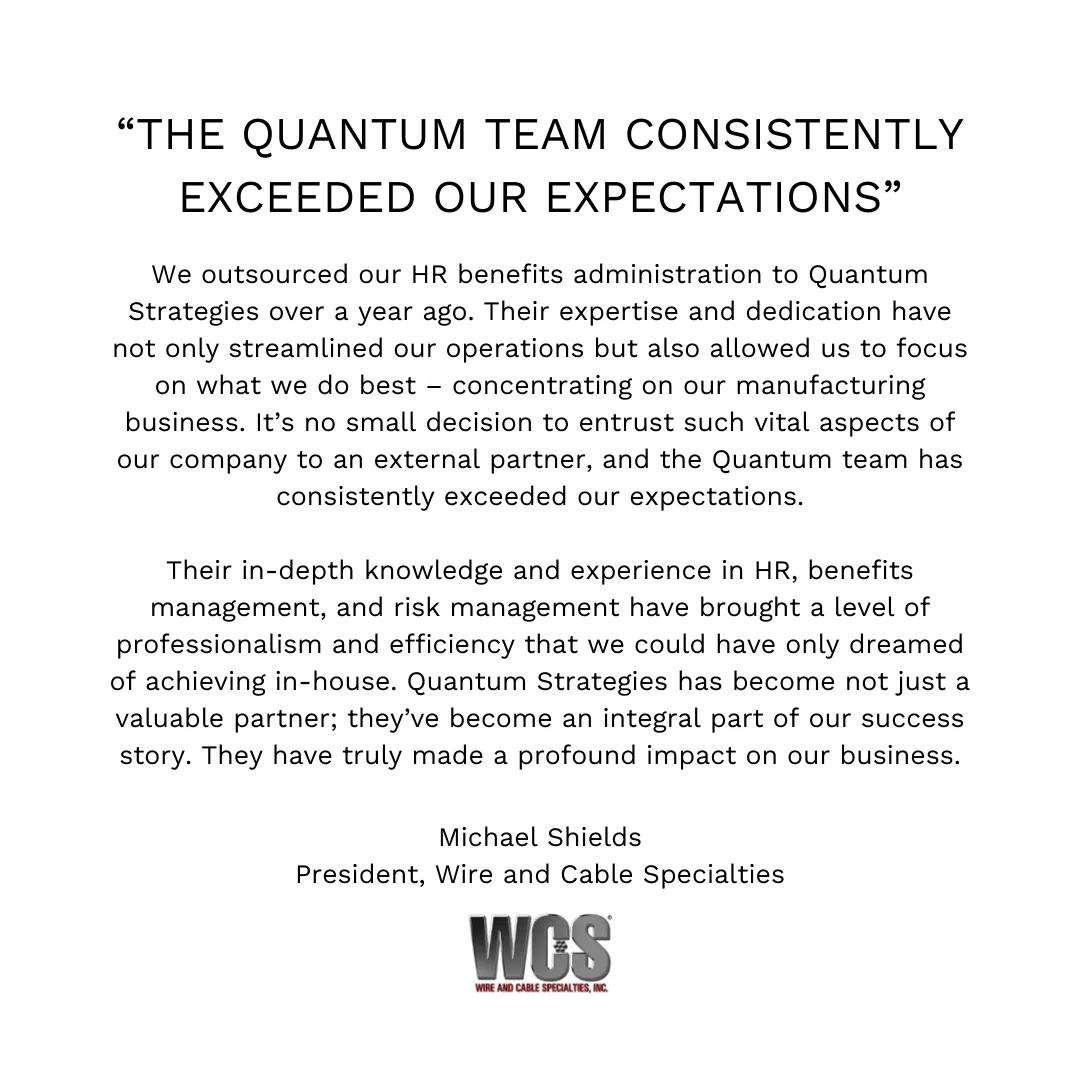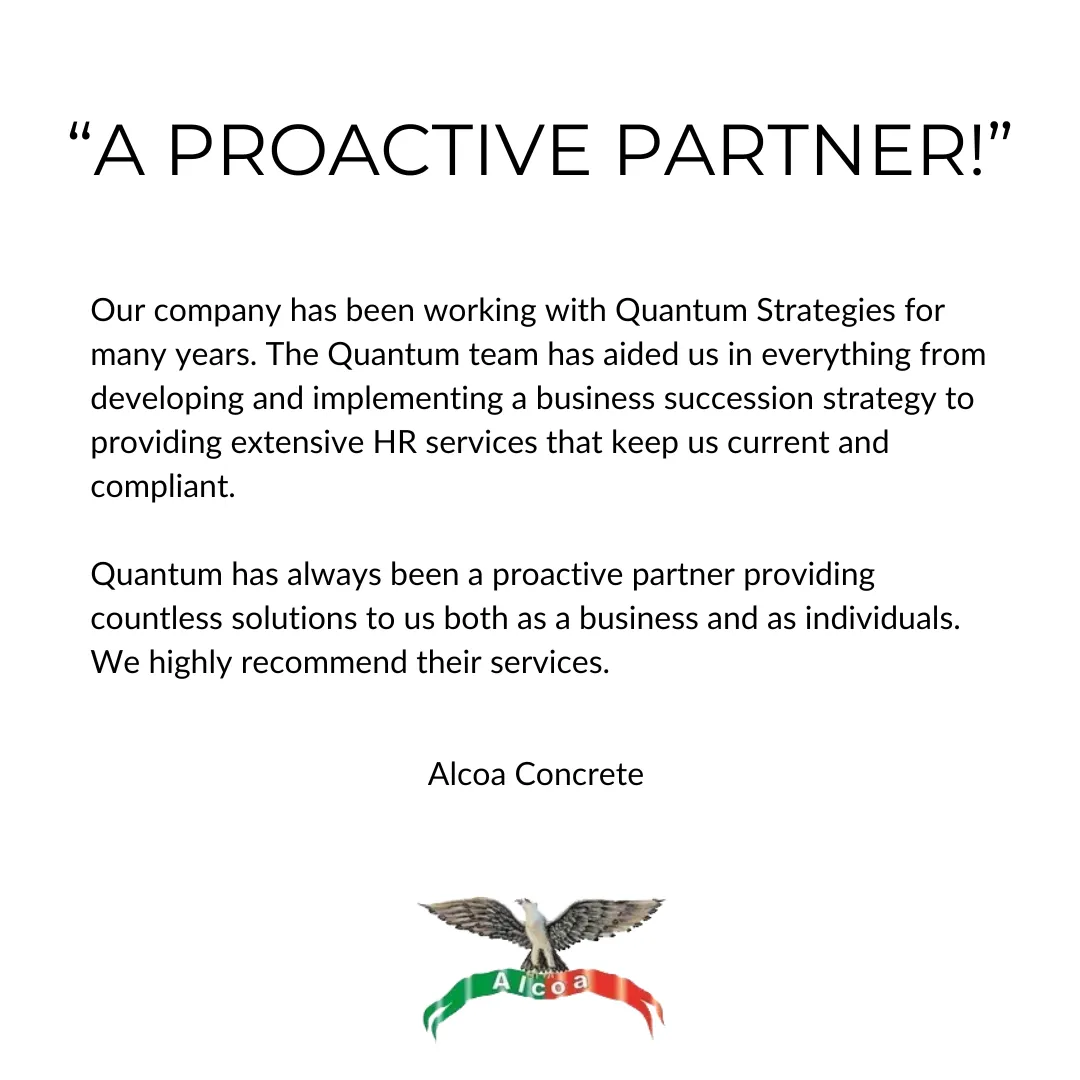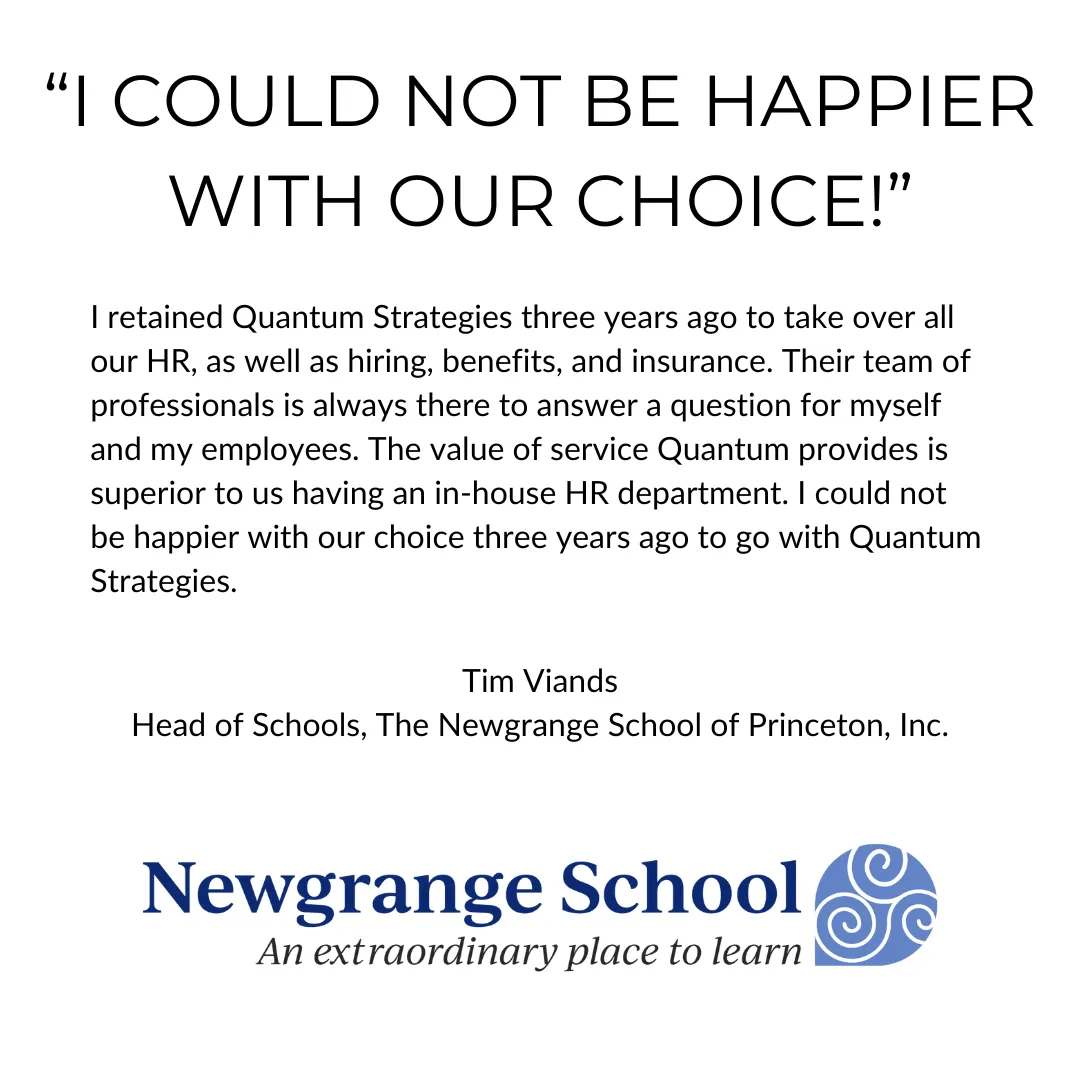Tailored HR Solutions as Unique as Your Business
Expert consulting and service to elevate your HR from a headache to a value driver.
Does Your HR Function Make the Grade?
Take our 5-minute quiz and evaluate the effectiveness of your HR function.

How We Help
We Focus on Your HR Needs,
So You Can Focus on Your Mission.
At Quantum Strategies, we understand that effective human resource management is the cornerstone of every successful business, regardless of size. Our mission is to provide tailored HR solutions that align perfectly with your unique business needs and growth stage.
Our Services
Navigating Change with Confidence: Quantum Expert HR Solutions
From Policy Assistance to Leadership Succession Planning, Quantum Strategies is Your Ultimate HR Resource to Solve Your Business Challenges.
HR Operational
Assessments
Unlock the full potential of your HR department. Our collaborative approach brings clarity and efficiency to your HR operations, providing a thorough analysis of your department's structure, costs, effectiveness, and needs.
Comprehensive Analysis: Detailed evaluation of your organization, workgroups, and individual roles for optimized efficiency.
Objective Insights: Receive a clear blueprint highlighting your HR department's strengths, weaknesses, and gaps.
Strategic Recommendations: Actionable plans focusing on technology utilization, communication enhancement, and leveraging department strengths.
HR Consulting and Managed Services
Tailored to align with your unique needs, our HR consulting and managed services enhance operational efficiency and effectiveness, allowing you to focus on your core mission while we optimize your HR investment.
Expert Supplemental Support: Strengthen your existing HR team with specialized expertise to navigate complex HR landscapes.
Personalized, Agile Solutions: Customized services for organizations with or without HR teams, adaptable to your specific requirements.
Goal-Oriented, Clear Communication: Delivering precise, actionable strategies that align with your organization’s goals and ensure successful execution.
Custom HRIS Design and Integration
Revolutionize your HR data management. Our team will evaluate your current human resources technology stack, offer recommendations, and then integrate your new and existing systems with our cutting-edge technology, ensuring seamless data flow and optimized operational efficiency.
Seamless Integration: Connect legacy systems with modern platforms for streamlined data management.
Tailored Design: Custom HRIS solutions uniquely crafted to meet your specific business needs.
Advanced Analytics: Leverage data-driven insights for strategic decision-making and operational excellence.
“Successfully steering through the specialized HR challenges within organizations of all kinds demands expert understanding, strategic planning, and precise implementation. With comprehensive knowledge of these challenges and the right solutions, your business can stay focused and successful in their vital missions.”
William J. Rizzo

Who we Are.
We Focus on Your HR Needs,
So You Can Focus on Your Mission.
At Quantum Strategies, we recognize that proficient management of human resources is fundamental to the success of any enterprise, irrespective of its scale. Our objective is to deliver customized human resource solutions that are in perfect harmony with your distinct business requirements and developmental phase.
Constant Improvement
Commitment to Customers
High Level Of Knowledge
Best Service You Can Get

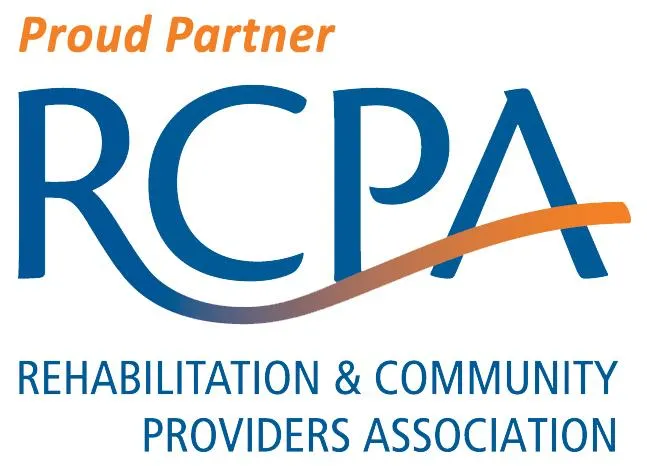
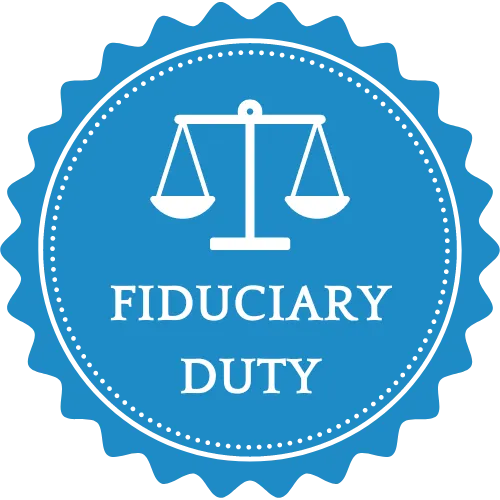
Why Choose Us
A True Partner to Solve Your Most Complex HR Challenges.
Empowering HR Innovation and Compliance
Commitment to 100% Client Satisfaction
People-First Approach

Peace of Mind:
Handle ongoing compliance with ease

Employee Satisfaction:
Build a positive workplace with engaged employees

Strategic Confidence:
Drive strategy with advanced analytics

Leadership Development:
Equip your team with the tools to lead

2,245 +
Happy Clients

25 +
Years Of Experience

120 +
Professional Team
Testimonials
The Quantum Commitment - 100% CLIENT SATISFACTION!
At Quantum, we understand that your satisfaction matters most, and The Quantum Commitment is our way of putting that understanding into action. Experience the difference with a team that is dedicated to making your satisfaction the cornerstone of our service. Because when you choose Quantum, you choose excellence, reliability, and a commitment to exceeding your expectations every time.
Our Resources
Unveiling Proven Strategies and Insights.
Discover actionable tips, expert advice, and industry insights to fuel your journey towards success.

Fostering a Psychologically Safe Workspace
As we navigate the complexities of the post-pandemic world, the importance of mental health in the workplace has surged to unprecedented levels. According to research from the
American Psychological Association, 81% of employees are now actively seeking workplaces prioritizing mental well-being.
Key Challenges Faced by Human Resources in Nonprofit Organizations
The nonprofit sector brings its own set of specialized difficulties, especially in the area of human resources (HR). Although these difficulties may share some common ground with those in the for-profit industry, they possess unique characteristics that require special attention from nonprofit leaders.
FOUND THESE HELPFUL?
Explore Additional Articles and Resources In Our Blog

No Bad Teams, Only Bad Leaders

"Without training, they lacked knowledge.
Without knowledge, they lacked confidence.
Without confidence, they lacked victory."
- Julius Caesar (Roman Emperor)
Leaders must hold themselves accountable, as they set the team's standards from the start. If a leader is not accountable, their subordinates will lack respect and trust in their decisions. For example, a Little League coach who places a player at shortstop without the necessary skills risks the player's safety and the team's success. It’s the coach’s responsibility to ensure players are prepared for their roles, providing the training and confidence needed to succeed. Placing a player in the wrong position not only puts them in danger but also harms the team's overall mission.
Set the Standard
"A chain is only as strong as its weakest link."
Setting high standards is essential for strong leadership, but it’s not always easy, as team members differ in performance, values, experience, and knowledge. Effective leadership addresses these challenges by hiring strategically—following the principle of "interview hard, manage soft." By continually looking for talent, even when there is no immediate hiring need, leaders can avoid losing top candidates to competitors. Additionally, using behavior analysis helps assess personality traits that complement team dynamics, enabling managers to tailor communication and motivation effectively.
One critical question leaders face is whether to set standards based on the weakest link or the best performers. This decision is difficult because it involves balancing individual needs with team and organizational goals. While high standards should challenge everyone, they must also be inclusive, ensuring even the weaker members can contribute meaningfully. This approach prevents top performers from feeling undervalued, while still promoting team growth. Ultimately, standards should align with company objectives and future growth, helping the team stay competitive both within the company and in the broader market.
How does the leader ensure the standards are upheld?
Most leaders rise from subordinate roles, so reflecting on their own experiences can be a valuable starting point. What challenges did they face? Were standards clear? Was there room to voice concerns? Did the team feel micromanaged or left without direction?
Being a subordinate is difficult, especially when unclear instructions leave employees guessing. On the other hand, bad leadership can also involve giving too little guidance. Leaders must understand that frustration from subordinates is normal, but if they feel unable to voice concerns due to fear of retribution, it signals a deeper issue. By recognizing these challenges, leaders can adjust their approach to help subordinates reach their potential.
Value of psychological distance
While leaders may want to be seen as "one of the team," maintaining a clear sense of authority offers significant advantages. It helps leaders focus on the bigger picture—hitting goals, driving growth, and achieving success. Great leaders make decisions based on what’s best for the team, without worrying about personal feelings. This approach maintains high standards and ensures continuous success. Ultimately, job success has a greater impact on employees’ lives than having a friend at work.
Infinite mindset (Game Theory)

In his book Infinite Game, Simon Sinek distinguishes between finite and infinite games. Finite games, like sports, have fixed rules, players, and endpoints, with clear winners and losers. Infinite games, such as business or politics, have no endpoint; players and circumstances change, and success depends on continually adapting and surviving.
Poor leadership with a finite mindset may lead to short-term success, but it limits long-term growth. An infinite mindset, however, enables leaders to set enduring standards that guide teams beyond their tenure, fostering lasting success.
Identifying the weak link
If one team member consistently underperforms and isn't held to the same standards as others, it creates tension and affects team morale, potentially damaging the business over time. In coaching, business, and the military, focusing too much on personal feelings instead of performance can harm the team. While it's important to care for employees' well-being, leaders must address performance issues by offering proper coaching and placement. If an employee is unhappy or struggling, active listening and guiding them to the right role can help them contribute long-term. Leaders should provide constructive feedback to avoid setting a low standard that affects the whole team.

"A pack of jackasses led by a lion is superior to a pack of lions led by a jackass." - George Washington
This is one of my favorite quotes from George Washington. No matter what team, it cannot succeed with poor leadership. In many organizations, including professional sports, a manager or coach is the captain of the ship. That person has a lot of both positive and negative impact on the organization's success. However, amongst the best teams in any sport, there are players on the team who provide invaluable ways to avoid developing a bad leadership trait. It all cannot come from the top. Leadership does not just come from the general on the battlefield nor the manager in the dugout; many times, it's the sergeant on the battlefield or the catcher on the baseball diamond that will make the calls needed to achieve victory.
"Talent wins games, but teamwork and intelligence wins championships." -Michael Jordan
One soft skill that is imperative is creativity. We all have been creative at some point in our lives, even if we do not realize it, and we all have the capability of being creative again in the future if placed under the right conditions. As a strong leader, it is important to encourage creativity in your work environment because being creative at work can be the key factor to success. Let us look at why it is important to foster creative freedom in the workplace:
Create an environment of like-minded thinkers
Have you realized like-minded people usually cluster together? Brazil, for example, is home to the best soccer players in the world. There are countries with far better grass-roots level programs and facilities, but no country can develop players like Brazil. Another example is Palo Alto, California. Home to the best tech startups globally, and yes, anyone with a good idea would move to Palo Alto, but once they are there, the city's atmosphere plays a huge role in enhancing that creativity. If a company gives its employees creative freedom, it not only allows an individual to be creative but also has a positive impact on other employees by giving them confidence and allowing them to learn from the environment around them.
Increase workplace problem solving and productivity
Productivity focuses on efficiently executing tasks with good quality, while creativity is a spark of new ideas that often pulls us away from routine activities. Creativity and productivity can complement each other—creative ideas emerge when we step outside our usual flow of thought, allowing us to innovate, streamline processes, reduce costs, or develop new products. Creativity empowers employees, giving them a voice and emotional investment in their work, as they take ownership and see their ideas come to life, ultimately improving workplace productivity.
Improve ability to attract and retain quality employees
Creative organizations succeed by fostering an environment where employees have the freedom to innovate. Companies that allow creative freedom attract individuals eager to express their ideas. A prime example is Google, where founders Larry Page and Sergey Brin introduced the 20% rule in 2004. This rule allowed employees to spend 20% of their time on passion projects. The result? Innovations like Gmail, Google Maps, Google News, and AdSense. By encouraging creativity, Google turned employee ideas into some of its most valuable assets, proving the power of creative freedom in driving success.
"You do not lead by hitting people over the head -- that's assault, not leadership." - Dwight D. Eisenhower
Great leaders share key qualities, but leadership is always challenging, especially as blame for mistakes falls on them. The rise of millennials and Generation Z has brought new trends, work styles, and leadership approaches, making leadership even more complex. Each new generation will bring further changes, but certain leadership qualities, like adaptability, vision, and emotional intelligence, remain timeless.
Decisiveness

"The only man who never makes mistakes is the man who never does anything."- Theodore Roosevelt
Decisiveness is a crucial trait for great leaders. Once a leader commits to a decision, they must follow through with full dedication, inspiring others to follow. In the military, where decisions can be a matter of life and death, decisiveness is essential. In business, though the stakes may not be as high, making confident decisions is still vital. Sun Tzu in The Art of War warns against cowardice, defining it as timidity that prevents leaders from seizing opportunities. Similarly, in business, leaders must boldly embrace new challenges and opportunities.
Empathy
"As a leader, you should always start with where people are before you try to take them where you want them to go." – Jim Rohn, Entrepreneur & Author
Empathy might be the fuel to the leadership vehicle, without which the concept of a leadership role does not work. To keep it simple, empathy is understanding someone's emotions or being in someone else's shoes and seeing things from their perspective. Any team has people from various walks of life with different personalities, views on work, and values. Understanding each team member on an individual level not only makes them feel like they are cared for but also helps them progress toward their maximum potential.
Integrity
"The supreme quality for leadership is unquestionably integrity. Without it, no real success is possible, no matter whether it is on a section gang, a football field, in an army, or in an office." - Dwight D. Eisenhower
Integrity in leadership is essential for fostering a positive work environment. Leaders who are honest, trustworthy, and reliable build trust, while a lack of integrity erodes it, leading to decreased morale and productivity. Companies with ethical leaders tend to outperform those without. Studies show that ethical companies, like those on the WME index, consistently outperform their less ethical peers, including the S&P 500. While the exact reasons aren't clear, ethical companies likely attract loyal customers and avoid costly issues like lawsuits and fines, while unethical ones face greater financial risks.
Communication
"The art of communication is the language of leadership." - James Humes, Author
Any leader will spend 70% to 80% of their time communicating with their team or peers, and it will get difficult if any leader lacks good communication skills, being unable to share any of the bad or the good news. Good leadership and good communication go hand in hand. As a leader, it is vital to put forward your goals, values, or vision to several stakeholders throughout the organization. That is why a leader needs to express ideas with clarity, passion, and relevance. While communicating, you should always remember it is a 2-way street. To communicate well, we need first to learn to listen.
Passion
"When you set yourself on fire, people love to come and see you burn." - John Wesley, 18th Century Evangelist
When employees see a leader's dedication towards their work, the leader can spread the energy throughout the office. Moreover, you cannot fabricate passion in the workplace, every thought, action, and word will naturally show passion when someone has a love for their work. Passion can be contagious. The people around you can pick up that dedication to their work and make it their own. A group of like-minded, passionate people has the capability of turning any dream into a reality.
As a leader, you should constantly assess your strengths and weaknesses with the above qualities. These are skills that can be improved with hard work and focus throughout your career. Unlock your team's full potential with leadership-focused HR solutions. Contact us and let us help you build accountable, high-performing teams that thrive.
Connect
Keep Up with Our Latest News and Insights
Subscribe to Quantum Strategies' latest updates and insights.
Office: Philadelphia, PA | Glen Mills, PA | Washington, DC
Call 610.624.1770
Email: info@QS2500.com
Site: www.QS2500.com

